Discover the best guitar picks for beginners top options, tips for choosing the right pick, and how they can increase your playing experience. When starting your guitar journey. There are a lot of things that you first keep in your mind. One of them is guitar picks. This play an important role in your style, tone and performance. There are few aspects that are considerable during choosing guitar picks. It include what type of guitar picks, its thickness, pick’s material and shape. Here you will find all these aspects in detail. Stay focus and read carefully.
1. Dunlop Tortex – Standard Is a Classic Among Guitar Picks
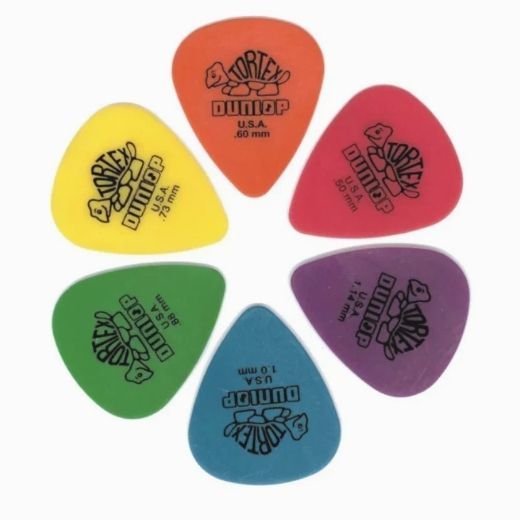
- The Dunlop Tortex picks are popular for their strongest and grip. They come in various thicknesses (from light to heavy). It allowing beginners to find the right feel for their playing style.
Specifications:
- Material: Delrin (Tortex)
- Gauges available: 0.50 mm, 0.60 mm, 0.73 mm (yellow), 0.88 mm (green), 1.00 mm (blue), 1.14 mm (purple)
- Shape: Standard teardrop
- Pack: often 12‑pick variety pack including two of each gauge
- Recommended Thickness: Medium (0.73 mm) for a balanced tone.
Perfect pick for:
- Versatile playing styles (lead & rhythm)
- Bright, articulate tone
- Excellent non‑slip grip
- Balanced flexibility/control at 0.88 mm
- Durable long‑wear plectrum surface
- Quick string release
- Recognizable color‑coded gauge system
- Good for practice, gigs, studio
- Consistent feel across picks
- Economical yet pro‑quality choice
2. Fender 351 Shape – Vintage Feel with Modern Guitar Pick Performance
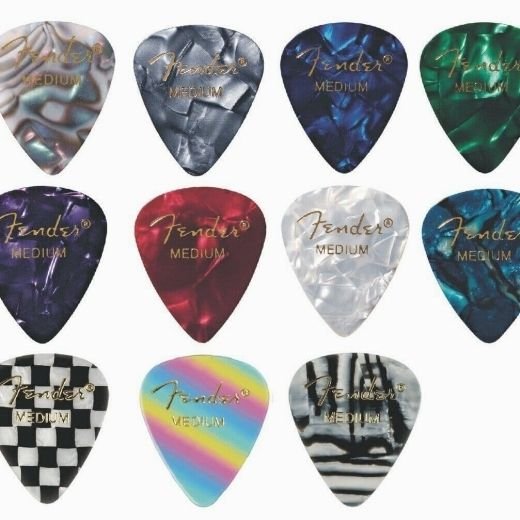
- The Fender 351 picks are a classic choice popular for their familiar shape and versatility. They come in various materials (celluloid, nylon) and thicknesses.
Specifications:
- Material: Premium Celluloid
- Shape: 351 (classic teardrop, ~1.5″ × 1.25″)
- Gauges: Thin (~.46 mm), Medium (~.71 mm), Heavy (~.97 mm), Extra Heavy (~1.22 mm)
- Grip: some versions have dotted, anti‑slip texture on celluloid surface
- Typical pack: 12-piece assorted colors
- Recommended Thickness: Medium (0.71 mm) for general use.
Ideal use for:
- Warm, rounded acoustic tone
- Smooth, vintage-feel strumming
- Balanced gauge choices for varied styles
- Traditional grip and feel
- Slight click/pop on strings for clarity
- Style-conscious players (classic look)
- Beginner-friendly multi-gauge sets
- Good for rhythm support and soft attack
- Reliable tonal consistency
- Comfortable pick for extended play
3. Ernie Ball Prodigy -Sharp, Precise & Ideal Guitar-Pick Upgrade
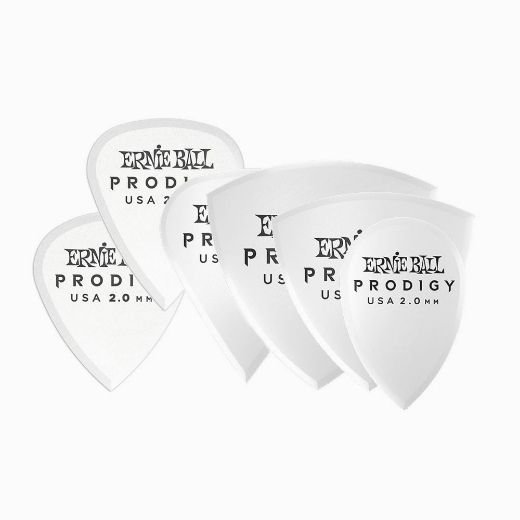
- The Ernie Ball Prodigy picks feature a unique shape with a beveled edge for smoother strumming and picking. They are made from a strong material that increase grip.
Specifications:
- Material: Delrin
- Gauges: often 1.5 mm (black), 2.0 mm (white)
- Shapes: Standard, Sharp‑tip, Shield, Mini, Teardrop
- Pack: usually select-shape 6‑pack
Excellent pick for:
- Laser‑sharp tonal definition
- Minimal friction glide
- Rock/metal lead articulation
- Heavy‑gauge precision
- Secure grip surface
- Speed picking and tremolo runs
- Long-lasting edge integrity
- Clarity on fast ripping lines
- Custom shape flexibility
- Focused control over dynamics
- Recommended Thickness: Heavy (1.5 mm) for those who prefer a firmer feel.
4. Jazz III (Dunlop) – A Precision Pick Trusted by Guitar Pros
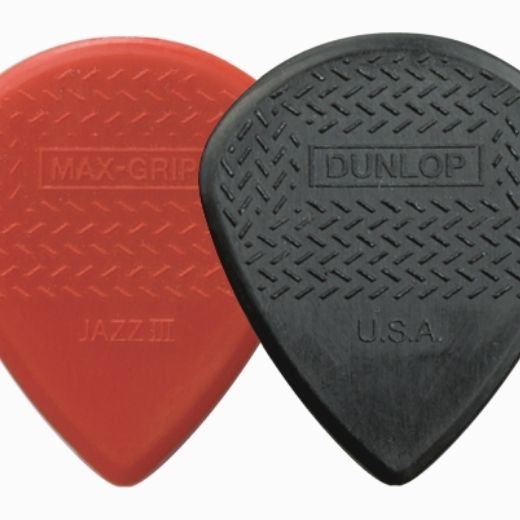
- The Dunlop Jazz III picks are small and pointed, making them great for fast playing and intricate picking. They are favored by many lead guitarists.
Specifications:
- Material: Nylon (also Ultex/Tortex in variants)
- Thickness: ~1.38 mm
- Shape: Jazz III – small, pointed
Ideal for guitars & genres where:
- Pinpoint accuracy matters
- Speed picking is vital
- Soloing precision is key
- Compact grip feel preferred
- Tight articulation needed
- Metal/jazz shredding
- Minimal pick‑contact surface
- Controlled rhythmic attack
- High‑speed legato playing
- Favoured by pro shredders
- Recommended Thickness: 1.38 mm for a firm feel.
5. Clayton Acetal – Durable & Smooth Guitar-Pick Experience
- Clayton Acetal picks are known for their smooth feel and durability. They come in various colors and thicknesses, making them visually appealing as well.
Specifications:
- Material: Acetal plastic (DuPont Delrin polymer) – matte finish for grip, glossy possible
- Gauge range: typically 0.60 mm to 1.90 mm, many models at ~1.0 mm–1.5 mm thickness
- Shape options: standard teardrop, rounded triangle, sharp-edged types
- Edge bevel: sharper edges for fast release and brisk attack
Ideal pick for:
- Extremely durable pick that resists chipping
- Fast release off strings for clarity
- Aggressive attack & sharp articulation
- Precise pick control in riffs & solos
- Minimal drag with matte grip
- Long lifespan under heavy use
- Ideal for heavy genres (metal, hard rock)
- Excellent consistency in tone & response
- Smooth gliding when polished
- Pro‑grade construction for gigging player
- Recommended Thickness: Medium (0.73 mm) for a balanced sound.
6. V-Picks (Various Models) – Custom Guitar Picks That Stand Out
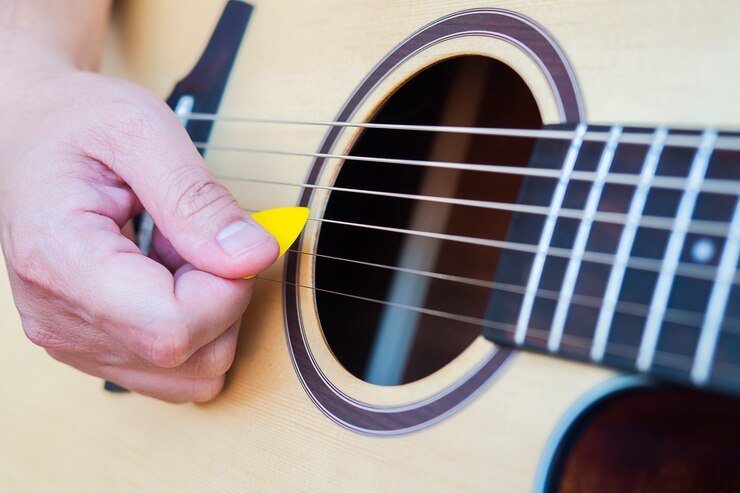
- V-Picks are known for their unique design and material, providing a warm sound and excellent grip. They come in various shapes and thicknesses.
Specifications:
- Gauge spectrum: extremely broad—from ~0.75 mm up to about 11.85 mm depending on model
- Shapes: over 100 handcrafted models (e.g., Tradition, Medium, Hellcat, etc.), for electric, acoustic, bass, mandolin
- Process: hand-ground bevel, tempered heat‑treated edges, flame‑buffed polish — yields each pick unique tactile feel
- Material: Cast acrylic (proprietary acrylic blend) hand‑finished and flame‑polished
- Recommended Thickness: Medium (1.0 mm) for a versatile option.
Perfect pick for:
- Rich warm resonance with acoustic or electric
- Bold tonal body and fullness
- High temperature-sensitive grip (responds to fingertip warmth)
- Polished bevel offers fluid string glide
- Made for expressive dynamics, bends & vibrato
- Unique handmade feel each time
- Wide thickness options suit many genres
- Signature models match playing style
- Durable acrylic build resists wear
- Great for players wanting tonal signature identity
7. Jim Dunlop Nylon Standard – Comfortable & Reliable Pick for Guitar
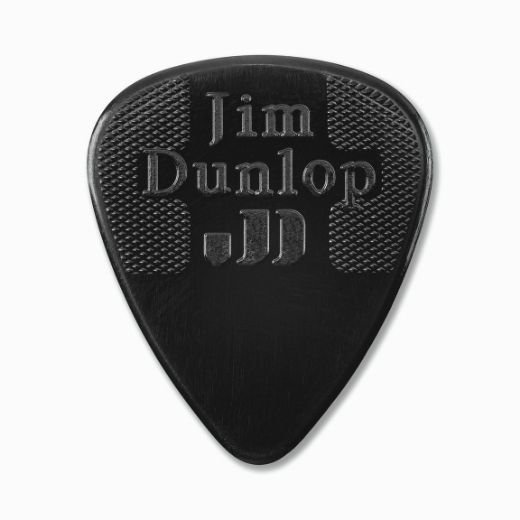
- These nylon picks are known for their flexibility and warm tone. They offer a different feel compared to other materials, making them suitable for various styles.
Specifications:
- Material: High‑quality Nylon with molded raised‑logo grip surface
- Gauges available: 0.38 mm, 0.46 mm, 0.60 mm, 0.73 mm, 0.88 mm, 1.00 mm, 1.25 mm, 1.50 mm (depending on series)
- Shape: Standard teardrop
- Texture: coarse grid raised grip logo (in Max‑Grip versions) for slip-free handling
Excellent pick for:
- Warm, flexible tone ideal for rhythm & fingerstyle
- Smooth string release via rounded edges
- Superior grip control (Max‑Grip texture)
- Wide gauge options tune feel & response
- Comfortable for long practice sessions
- Traditional, time-tested guitar tone
- Great value multi-gauge sets for learners
- Reliable for daily studio or live use
- Favoured by iconic guitarists (e.g. Cobain, Greenwood)
- Offers flexible dynamics from soft to strong attack depending on thickness
- Recommended Thickness: Light (0.60 mm) for strumming and fingerpicking.
8. D’Addario Planet Waves – Innovative Designs in Guitar Picks
- : D’Addario Planet Waves picks are designed with beginners in mind, offering a good grip and a variety of materials. They are available in multiple shapes and thicknesses.
- Pros:
- Comfortable grip with a variety of options.
- Affordable and widely available.
- Suitable for different playing styles.
- Cons:
- May not be as durable as other brands.
- Limited color options for some models.
- Recommended Thickness: Medium (0.73 mm) for a versatile choice.
Tips for choosing right Guitar Picks for beginners:
1. Thickness (Gauge)
The thickness of a guitar pick is one of the most important factors to consider for beginners. Picks come in a variety of thicknesses, typically measured in millimeters (mm). The right thickness can effect both your sound and playability.
- Thin Picks (0.40mm – 0.60mm):
- Best for strumming and rhythm guitar.
- Thin picks are flexible and glide easily across the strings, producing a lighter, more acoustic sound. They are ideal for beginners learning to strum chords.
- Examples: Dunlop Nylon .46mm, Fender Thin Celluloid.
- Medium Picks (0.60mm – 0.80mm):
- A great balance between strumming and picking. Medium picks offer enough flexibility for strumming while providing some control for playing single notes. This makes them a versatile choice for beginners who want to explore various playing styles.
- Examples: Fender Medium Celluloid, Jim Dunlop Nylon .73mm.
- Heavy Picks (0.80mm – 1.20mm):
- Best for lead guitar and single-note playing. Heavy picks provide precision and control for playing individual notes or power chords. However, they can feel stiff when strumming, especially for beginners.
- Examples: Fender Heavy, Dunlop Tortex 1.0mm.
2. Material
Guitar picks are made from many materials. Each give to the tone and feel of your playing. Here are some of the most common materials used in picks:
- Nylon:
- Nylon picks are flexible and lightweight. This is make it perfect for beginners who are learning to strum. They have a softer more merciful feel which helps with rhythm playing.
- Popular Nylon Picks: Jim Dunlop Nylon, Fender Nylon Picks.
- Celluloid:
- Celluloid is one of the most popular materials for guitar picks. It offers a bright tone and a smooth, glossy texture. Celluloid picks are ideal for beginners who want a pick that glides easily across the strings.
- Popular Celluloid Picks: Fender 351 Shape Celluloid Picks, D’Addario Celluloid.
- Tortex (Delrin):
- Tortex picks are slightly textured, offering a good grip and durability. They are less flexible than nylon but produce a bright, punchy tone. These picks are often used by guitarists who need more control, like rock or metal players.
- Popular Tortex Picks: Dunlop Tortex Standard, Ernie Ball Prodigy.
3. Shape
The shape of a guitar pick affects how it feels in your hand and how it interacts with the strings.
- Standard Shape (351 Shape):
- This is the most useable pick shape with a rounded body and a pointed tip. It is very useful and provide a good balance for both strumming and picking. Beginners will find this shape comfortable and easy to control.
- Popular Picks: Fender 351, D’Addario Standard.
- Jazz Shape (Small and Pointed):
- Jazz picks are smaller and more pointed, offering more precision for lead playing and intricate picking. However, they may feel awkward for beginners who aren’t yet focused on lead guitar.
- Popular Picks: Dunlop Jazz III, Ernie Ball Jazz.
- Teardrop Shape:
- Teardrop picks are smaller than standard picks and have a more pointed tip. Some beginners might find them harder to grip, but others prefer them for precision.
- Popular Picks: Dunlop Teardrop, D’Addario Duralin.
For most beginners, the standard shape (351) is a great starting point, offering comfort and versatility.
4. Grip and Texture
One of the most common problem beginner’s face is the pick slipping out of their fingers during play. Some picks are designed with grip-enhancing textures to prevent this:
- Textured Picks:
- Picks like the Dunlop Max-Grip or the D’Addario DuraGrip have raised surfaces or rough textures to help prevent slippage.
- Non-Textured Picks:
- Non-textured picks, such as traditional celluloid picks, are smooth but can sometimes slip, especially when your hands sweat.
Beginners who find it difficult to maintain a grip on smooth picks might prefer textured picks for better control.
5. Best Guitar Pick Recommendations for Beginners
Here are some specific picks that work great for beginners:
- Fender 351 Shape Celluloid Picks (Thin, Medium, Heavy):
- A classic choice, these picks come in various thicknesses and offer great tone with smooth playability. Beginners can try different thicknesses to see which suits them best.
- Dunlop Tortex Standard Picks:
- These picks are strong with a slightly textured feel for added grip. They are available in a wide range of thicknesses. That making it perfect for experimenting with different styles.
- Ernie Ball Prodigy Picks:
- These are thicker, with a beveled edge that makes them easy to hold and play with precision. They’re great for beginners who want to explore more control and accuracy.
- Jim Dunlop Nylon Standard Picks:
- These are lightweight, flexible, and low prices. These picks are perfect for beginners learning to strum. They’re also strong and come in various thicknesses, so you can experiment with different sizes.
Conclusion:
In conclusion, the best guitar pick for beginners ultimately depends on your playing style, guitar type, and personal preference. Starting with thin or medium picks is a great way to develop control and comfort, while experimenting with materials and grips can help you find the perfect fit. Variety packs are especially helpful for discovering what works best for you. Remember, there’s no one-size-fits-all solution—take the time to try different picks and enjoy the process of finding your perfect match as you grow in your musical journey. Want to shape your tone like a pro? Check out our list of the 10 Best Guitar Pedals in 2024 to find the perfect pedal for your playing style.


